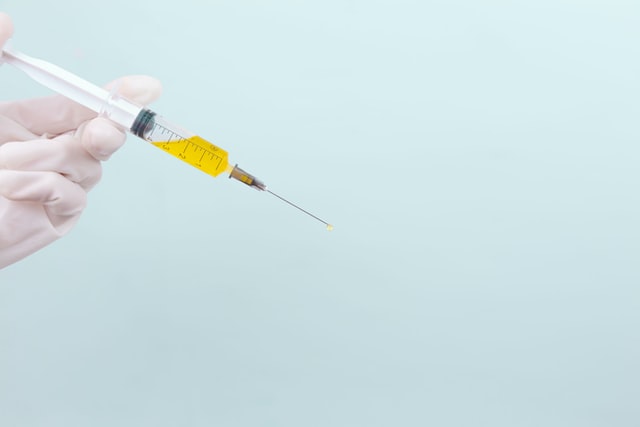Mesothelioma Treatments
While there is no cure for mesothelioma, patients may be able to improve their quality of life through a combination of treatments, including surgery, medication, chemotherapy, and radiation.
Mesothelioma is typically treated with a combination of treatment methods.
Mesothelioma is an aggressive form of cancer that often requires aggressive forms of treatment to help alleviate a patient’s symptoms and improve their life expectancy. Patients can be made more comfortable by trying combinations of treatments like surgery, medications, chemotherapy, and radiation. Holistic treatment options, including massage, diet alterations, and exercise, can also be used alongside more traditional forms of treatment.
Traditional Mesothelioma Treatments
The three most common mesothelioma treatments are chemotherapy, radiation, and surgery. Depending on the type and stage of your mesothelioma diagnosis, your doctor may recommend a combination of these treatment options.

Chemotherapy
If you don’t qualify for surgery, your doctor will typically recommend chemotherapy. Chemotherapy drugs are designed to shrink tumors and kill cancer cells to discourage tumor regrowth. While chemotherapy may triple life expectancy, some mesothelioma patients may experience side effects. Common side effects of chemotherapy treatment include anemia, loss of appetite, vomiting, lethargy, and aches and pains.

Surgery
Depending on the type and stage of mesothelioma you have, there may be several surgical options available to you. You are more likely to benefit from mesothelioma surgery if you are still in the early stages of the disease. Your doctor will likely recommend a treatment plan that includes a combination of surgery and chemotherapy in an attempt to shrink and remove your tumors. Surgery can help increase your life expectancy and improve your overall comfort.

Radiation
Like chemotherapy, radiation is often recommended alongside or in lieu of surgery. Radiation is recommended for pleural mesothelioma rather than peritoneal mesothelioma as it targets the chest. In addition to reducing chest pain, radiation may also reduce the likelihood of recurrent issues and cancer growth in treated areas.

Multimodality Treatment
Your doctor may recommend a combination of one or more forms of conventional mesothelioma treatment, what is referred to as multimodal therapy. This is typically recommended for patients in the early stages of mesothelioma in order to help improve life expectancy. A combination of chemotherapy, radiation, or surgery can help reduce mesothelioma symptoms and improve quality of life.
Treating Pleural Mesothelioma
Pleural mesothelioma is a form of cancer most often caused by asbestos inhalation.
The asbestos particles damage the lining of the lungs (pleura) and cause tumors and other growths that can cause chest pain and difficulties breathing. There are several ways to treat pleural mesothelioma and alleviate its symptoms.
Surgery
Surgery is most often recommended for pleural mesothelioma patients whose cancer is still in an early stage.
Two surgical options are commonly offered to pleural mesothelioma patients who are eligible for surgical treatment.
Pleural Pneumonectomy: This is an invasive procedure that involves removing the entire lung that has been affected by cancer, as well as all surrounding areas where cancer has spread. This can include lymph nodes, the lining of the chest and heart, or the diaphragm.
Pleurectomy Decortication: This type of surgery keeps the lung intact, only removing areas where cancer is present. This may include the linings of the lung(s), chest wall, heart, and diaphragm if they’ve been affected by cancer. It is much less invasive than pleural pneumonectomy but is still considered an aggressive form of treatment as it does remove a considerable amount of tissue.

Chemotherapy
Chemotherapy is commonly recommended to help kill cancerous cells. For pleural mesothelioma patients, chemotherapy drugs can either be administered traditionally or through an experimental procedure that injects heated chemotherapy drugs directly into the chest cavity. This procedure can only be done if all tumors and other visible cancerous spots have been removed from the chest cavity. Chemotherapy offers considerable benefits for patients with pleural mesothelioma, including a potentially longer life expectancy and a reduction in pain and discomfort.

Radiation
There are two types of radiation therapy that may be recommended for patients with pleural mesothelioma. The most common is external beam radiation, which uses high doses of radiation administered through a machine outside the body to kill off cancerous cells in the chest cavity.

Your doctor may also recommend brachytherapy, which is an internal form of radiation. Brachytherapy consists of implanting radioactive material inside the body to administer higher and more targeted doses of radiation.
Treating Peritoneal Mesothelioma
Peritoneal mesothelioma affects the lining of the abdomen, known as the peritoneum.
Surgery and chemotherapy are typically recommended to treat this form of mesothelioma as radiation isn’t as effective.
Patients with early peritoneal mesothelioma may undergo cytoreductive surgery, which removes tumors from the abdominal lining. Heated intraperitoneal chemotherapy may also be recommended. This form of chemotherapy kills off cancerous cells by injecting chemo drugs into the lining of the abdomen after a surgical procedure.
Palliative Treatment
Palliative treatments don’t necessarily reduce tumor size or kill cancerous cells but they do help peritoneal mesothelioma patients manage their symptoms and live more comfortably. A palliative treatment plan may include medication to relieve chemo or radiation side effects, therapy to treat depression or anxiety, or resources for family members and caregivers.
Mesothelioma treatments may offer relief for patients who are struggling with painful and uncomfortable symptoms.
The most common treatment options are:
-
Paracentesis
Paracentesis is a procedure that involves using a needle or catheter to drain excess fluid in the abdominal cavity of peritoneal mesothelioma patients.
-
Radiation
Radiation is most successful killing cancer cells in patients with pleural mesothelioma. However, radiation treatments may also offer pain relief and help to prevent the regrowth of cancer cells.
-
Thoracentesis
This pleural mesothelioma procedure uses a needle to remove excess fluid around the lungs, helping patients breathe easier.
-
Pericardiocentesis
When mesothelioma cancer cells spread to the heart, pericardiocentesis may be recommended. This procedure helps remove excess fluid around the heart.
-
Pleurodesis
Since fluid buildup is a common problem for patients with mesothelioma, pleurodesis uses medicine to help seal the pleural cavity where excess fluid often collects.
-
PleurX Catheter
If you suffer from excess fluid around your lungs, your doctors may implant a catheter to help regularly drain fluid to help you breathe easier and more comfortably.
Emerging Mesothelioma Treatments
The following forms of treatment are still being used in clinical trials to gauge their efficiency in treating mesothelioma. While they are still in the experimental phase, they may help treat mesothelioma and reduce symptoms in some patients.
Immunotherapy
Immunotherapy drugs boost your immune system so that your body is better equipped to fight off cancerous cells. While the benefits of immunotherapy are still being researched for mesothelioma, some immunotherapy drugs are currently being used to treat other forms of cancer.

Gene Therapy
Gene therapy uses genetic material to replace cancer-causing genes with healthy copies. The key to treating mesothelioma could be repairing the p53 gene that is damaged by mesothelioma. This gene curbs tumors and inhibits the growth of cancer by reducing the replication of cancerous cells.

Cryotherapy
Cryotherapy kills cancerous cells by freezing them. It may also be used to minimize tumors and help reduce patient discomfort. Cryotherapy is typically recommended alongside surgery.

PleurX Catheter
One of the unfortunate symptoms of pleural mesothelioma is fluid buildup around the lungs which may cause chest pain and difficulty breathing. A PleurX catheter can be inserted into the chest to regularly drain fluid, eliminating the need for regular hospital visits for draining procedures.
Photodynamic Therapy
Photodynamic therapy injects a photosensitizing chemical into the areas of the body where mesothelioma cancer cells are spreading. Once injected, light is used to activate the chemical to kill off cancerous cells.
Virotherapy
Virotherapy inserts natural or genetically modified viral cells into the body to find and kill off cancerous cells. This may help delay the spread of mesothelioma.
Epigenetic Therapy
Epigenetic therapy helps repair DNA to prevent cells from becoming cancerous. Though it is still being tested in clinical trials, this therapy has shown promising results in treating mesothelioma patients.
Alternative Therapies
In addition to traditional mesothelioma treatments, some patients may find alternative therapies such as dietary changes, meditation, or medical marijuana useful in alleviating painful symptoms.

You should always consult your doctor or pharmacist before adding alternative therapies to your treatment plan. If approved, alternative therapies may help you manage your mesothelioma symptoms.
Common alternative mesothelioma treatments include:
-
Nutrition
Proper nutrition plays a key role in helping cancer patients reduce their symptoms and boost their energy. Nutrition is especially important for those undergoing chemotherapy as chemo drugs can significantly reduce appetite and cause nausea. Eating smaller meals during the day that include a balance of protein, vegetables, and healthy fats is important, particularly for mesothelioma patients as they often require a high-caloric diet featuring additional protein and iron sources.
-
Medical Marijuana
Many mesothelioma patients find smoking marijuana or consuming edibles greatly reduces their pain and helps them regain their appetites. Medical marijuana may be especially beneficial for patients undergoing chemotherapy and radiation, as it can help reduce chest pains and nausea. It is important to consult your doctor or pharmacist before you using marijuana to treat your symptoms.
-
Yoga and Meditation
There have been several studies suggesting that meditation can help patients relax their muscles and release tension. Meditation may also help relieve stress and anxiety while navigating a mesothelioma diagnosis and treatment.
-
Therapy
One of the most important elements of any cancer treatment is mental health. A mesothelioma diagnosis can feel overwhelming, so it’s important that patients have someone to talk to about their worries and struggles.
Cancer Centers
Cancer centers offer a full staff of doctors, surgeons, and researchers who specialize in mesothelioma treatment. Mesothelioma behaves differently from other forms of cancer, so having a mesothelioma specialist create your treatment plan can make all the difference in your journey.

Some cancer centers offer special seminars, clinical trials, and support groups for mesothelioma patients and their families. With their specialized training and familiarity with the latest mesothelioma treatments, these treatment centers may be able to offer a greater level of support and care.

Many of the top mesothelioma researchers and medical experts work at cancer treatment centers, like Brigham and Women’s Hospital and the University of Texas MD Anderson Cancer Center. Mesothelioma patients may find comfort in the level of expertise and resources these centers can provide.